新概念第二册_Lesson 33 Out of the darkness课件(共28张PPT,内嵌视频)
文档属性
| 名称 | 新概念第二册_Lesson 33 Out of the darkness课件(共28张PPT,内嵌视频) | 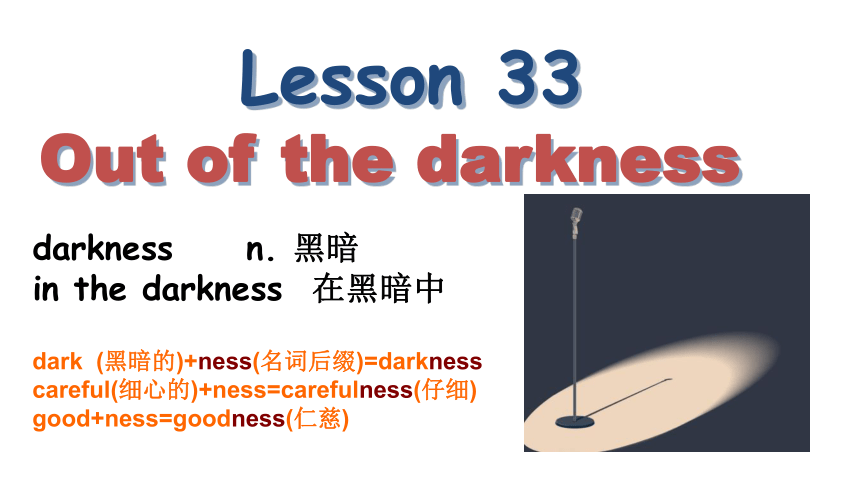 | |
| 格式 | pptx | ||
| 文件大小 | 19.9MB | ||
| 资源类型 | 教案 | ||
| 版本资源 | 新概念英语 | ||
| 科目 | 英语 | ||
| 更新时间 | 2024-01-17 20:52:34 | ||
图片预览

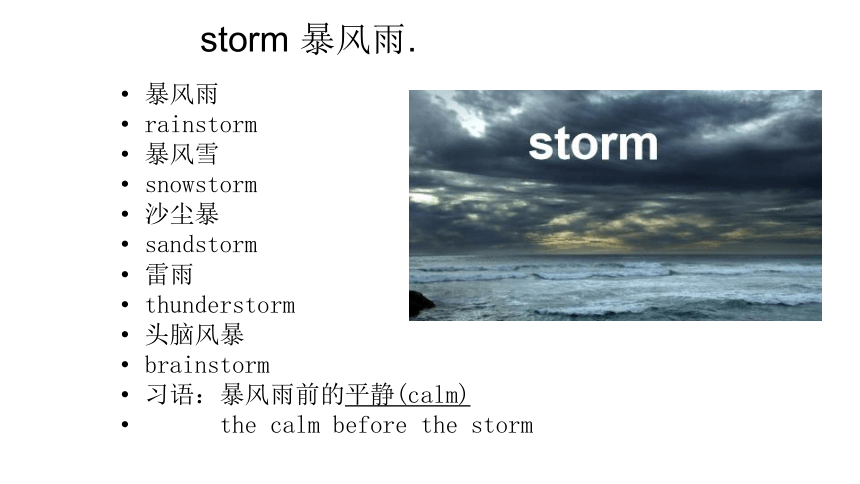

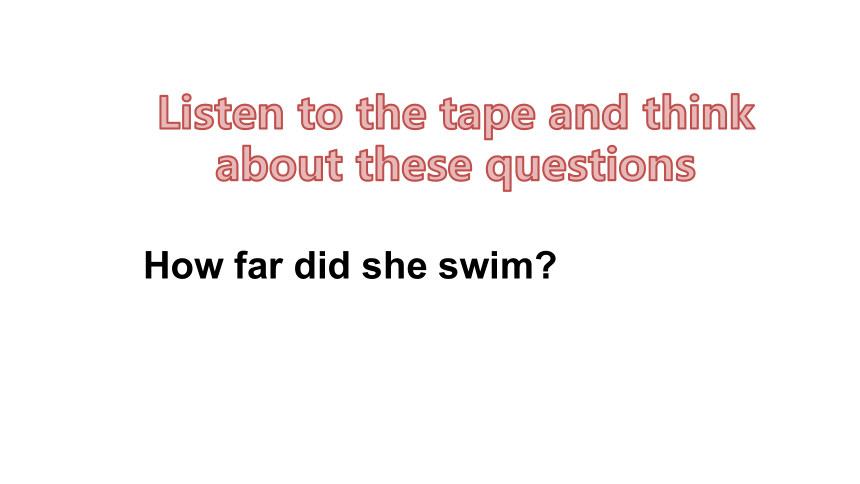

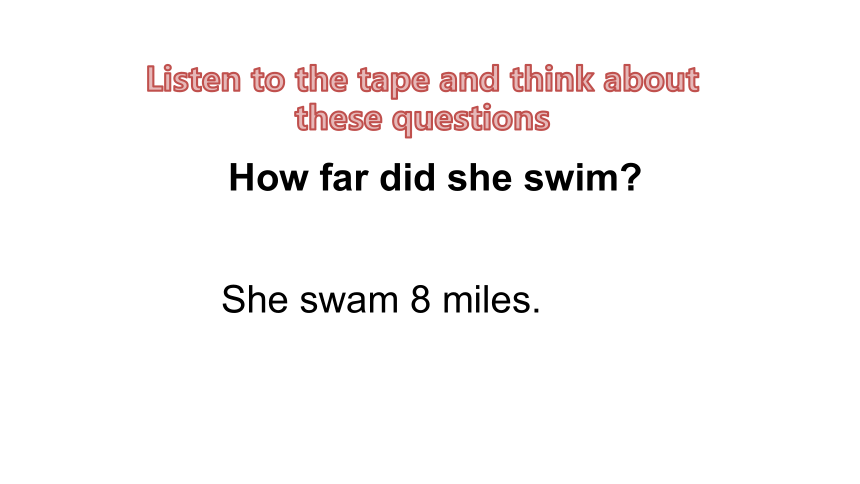
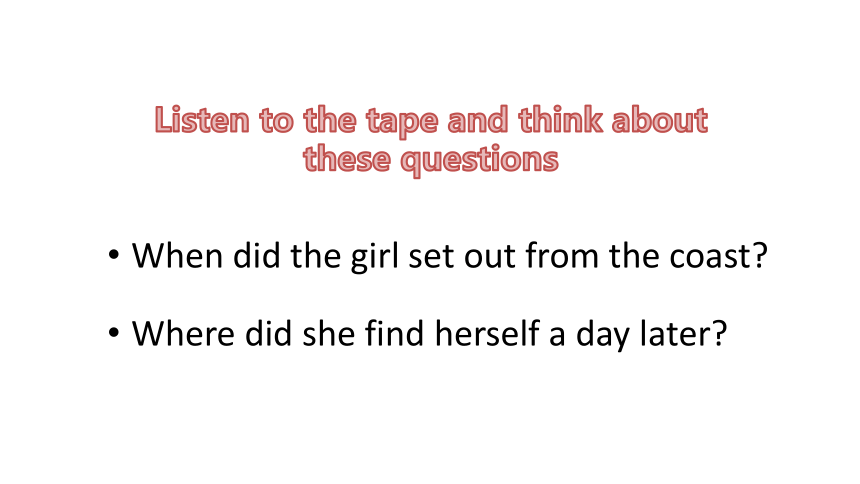

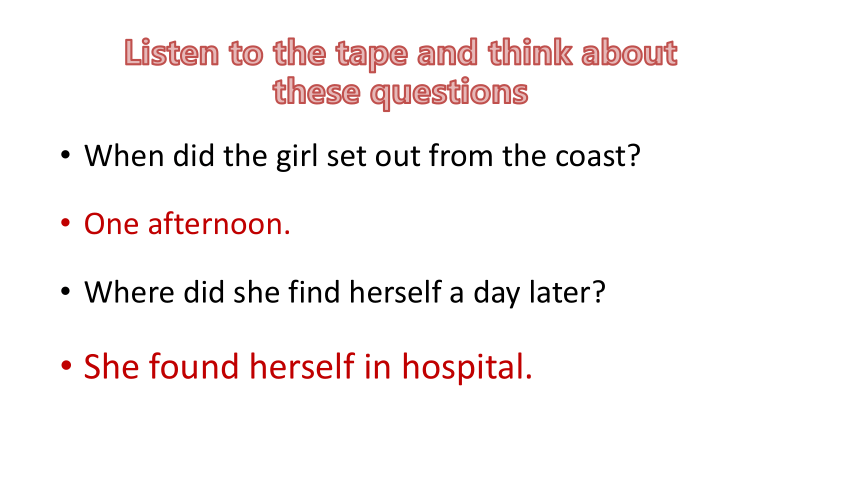
文档简介
(共28张PPT)
Taxi!
Lesson 33
Out of the darkness
darkness n. 黑暗
in the darkness 在黑暗中
dark (黑暗的)+ness(名词后缀)=darkness
careful(细心的)+ness=carefulness(仔细)
good+ness=goodness(仁慈)
storm 暴风雨.
暴风雨
rainstorm
暴风雪
snowstorm
沙尘暴
sandstorm
雷雨
thunderstorm
头脑风暴
brainstorm
习语:暴风雨前的平静(calm)
the calm before the storm
Enjoy the video
Listen to the tape and think about these questions
How far did she swim
Listen to the tape and think about these questions
How far did she swim
She swam 8 miles.
Listen to the tape and think about these questions
When did the girl set out from the coast
Where did she find herself a day later
Listen to the tape and think about these questions
When did the girl set out from the coast
One afternoon.
Where did she find herself a day later
She found herself in hospital.
Language points
Nearly a week passed before the girl was able to explain what had happened to her.
nearly adv. 将近
nearly a week 快一个星期了
explain v. 解释, 叙述
explanation n. 解释
Could you give me an explanation 能给我一个解释吗
Language points
Nearly a week passed before the girl was able to explain what had happened to her.
“一段时间以后”句型:
sometime later…
Three days later, my mother returned.
Three days passed and then my mother returned.
并列句, 既强调某人做某事, 又强调时间(有多久)
…passed before…
Three days passed before my mother returned.
强调时间(这么久的时间, 时间状语从句, 后面是从句)
Language points
Nearly a week passed before the girl was able to explain what had happened to her.
He could walk forty miles a day in the past.
(具备这种能力,但不一定实际去做。)
He was able to walk forty miles a day last year.
(不仅具有这种能力,而且实际做了。)
Language points
One afternoon she set out from the coast in a small boat and was caught in a storm.
set out = set off 出发
set out from… 从……出发
be caught in+灾难 (突然)遇到/上(风暴等)
be caught in an earthquake (earthquake n. 地震)
I was caught in a rain. 我遇上了一场雨
遇上人用meet, 遇上灾难用be caught in…
Language points
Towards evening, the boat struck a rock and the girl jumped into the sea.
towards evening 天越来越晚
strike 强调的往往是猛烈的撞击
Language points
Then she swam to the shore after spending the whole night in the water.
“to”强调朝那个方向去,
但没有强调越来越近;
“towards”朝那个方向去,
towards 强调nearer and nearer(强调越来越近)
Language points
Then she swam to the shore after spending the whole night in the water.
Shore :是这三个词中最普通的一个,可指湖、海等的岸:the western shore of the Pacific 太平洋西岸
Bank :河岸,湖案
Some children were playing games on the bank.
Coast :海岸,通常特指与海洋相接的整个一长条陆地;还常与地图、气候及海防有关
China has a very long coast. 中国的海岸很长。
Coast guard 海岸警卫队
Language points
During that time she covered a distance of eight miles.
不管是“游过”,还是“飞过”,还是“爬过”等等,都可以“cover”(覆盖)这个好词
The bird covered the distance in three minutes.
a distance of+具体长度 多长的距离,表示具体的距离
the red army covered a distance of 25000… 两万五千里长征
Language points
Early next morning, she saw a light ahead.
a light ahead.
前方的一盏灯(ahead 放在被修饰词的后面)
Language points
Early next morning, she saw a light ahead a light ahead.
ahead adv. 在前面
ahead 的用法:
① 放在被修饰词的后面作定语, 定语后置
light ahead 前方的灯光
② ahead of… 在……前面
He went ahead of me. 他走在我前面
③ go ahead 朝前走;请随便(回答请求时用)
--Would you mind my using your telephone / Can I use your telephone
--Ok, go ahead.
Language points
On arriving at the shore, the girl struggled up the cliff towards the light she had seen.
刚听到这个消息,她就晕了过去。
On hearing the news, she fainted.
= When she heard the news, she faint .
On arriving the home, it began to rain.
如果是两个不同的主语,则不能使用 “on + 动名词”的结构 !
struggle: v 努力,斗争
n. 努力,斗争
他努力控制住自己的脾气。
He struggled to control his temper.
在打斗中,有几个人受伤。
Several people were hurt in the struggle.
灯塔
Language points
That was all she remembered.
all作表语,是先行词, she remember 修饰 all 作定语从句, 省略 that
That was all I wanted to say.
那就是我想说的全部
Language points
When she woke up a day later, she found herself in hospital.
find +宾语+宾补
发现……(宾补可以由形容词或介词短语充当)
find the books tidy 发现书摆放得整齐
When I woke up, I found myself in bed.
【Key structures】
表示方向和目的地的介词和副词
① 表示“上、下”的两对小品词是on和 off,up和 down
Jim’s standing on the roof. I hope he won’t fall off.
Tom’s climbing up the tree. I hope he won’t fall down.
② 表示“来、去”的一对小品词是from和to;towards(强调越来越近)的意义和to(强调目标)相近,表示“朝,向,接近”等;for 在有些动词后面也表示“往,向”的意思
The ball was coming towards me.
The plane flies from Moscow to New York.
He went for home.
leave for… 动身到某地(强调离开,出发)
Yesterday my father left for Tianjin.
set out for… 动身到某地
He left/ set out for New York yesterday.
head for/to 前往 (强调“去”)
【Key structures】
表示方向和目的地的介词和副词
③ 表示“进去,出来”这两种方向的介词为into(进、入)和out of(从...出来);表示“在某个地方”或“在……里面/外面”可用at(含有一种瞄准的概念,方向性),in,out of等;表示目的地或位置往往用at
aim at,fire at(瞄准开火),throw at,threw to the bank
Tell him go into my house.
Did you stop anywhere on your way to the office
去办公室的路上你在别的地方逗留过吗?
④ 表示“穿过,越过,绕过”等动词时,往往用through,across,under,over,round等介词
How did you get through the fence 你怎么穿过篱笆的?
How did you get over the wall .
【Special difficulties】
Pass and Past
pass和past的区别主要是词义上的区别,pass是动词,其过去式为passed,过去分词是passed或past。
当作及物动词用时,可表示“经过,通过(考试),超过”等,作不及物动词用时可表示“(时间等)消逝”。
Your sister passed me in her new car, driving great speed.
I’ve passed/past my French test.
A month has passed/past since I left home.
past 可以作形容词、介词、名词等,作形容词时表示“以前的,过去的”等;作介词时表示“经过,超出(范围等)”;作名词时表示“过去,昔时,往事”等。
Frank is proud of his past experience.
I go past the garden.
Can you tell me something about your past
【Special difficulties】
Next and Other
next表示时间顺序上“紧接的,下一个”,如果以现在为基准,则 next前一般不加the;如果以过去或将来的某一时间为基准,则 next 前面要加 the或其他修饰词。
next day 第二天
Mary phoned the next day to tell us that she couldn’t come to the party.
第二天玛丽打来电话告诉我们她不能参加晚会了。
the other day =a few days ago (几天前),
Mary phoned the other day to tell us that she had arrived in London.
前几天玛丽来电话告诉我们她已到达伦敦。
the other day 出现一定是过去时;next day有可能是过去式, 有可能是将来式
Thank you
Taxi!
Lesson 33
Out of the darkness
darkness n. 黑暗
in the darkness 在黑暗中
dark (黑暗的)+ness(名词后缀)=darkness
careful(细心的)+ness=carefulness(仔细)
good+ness=goodness(仁慈)
storm 暴风雨.
暴风雨
rainstorm
暴风雪
snowstorm
沙尘暴
sandstorm
雷雨
thunderstorm
头脑风暴
brainstorm
习语:暴风雨前的平静(calm)
the calm before the storm
Enjoy the video
Listen to the tape and think about these questions
How far did she swim
Listen to the tape and think about these questions
How far did she swim
She swam 8 miles.
Listen to the tape and think about these questions
When did the girl set out from the coast
Where did she find herself a day later
Listen to the tape and think about these questions
When did the girl set out from the coast
One afternoon.
Where did she find herself a day later
She found herself in hospital.
Language points
Nearly a week passed before the girl was able to explain what had happened to her.
nearly adv. 将近
nearly a week 快一个星期了
explain v. 解释, 叙述
explanation n. 解释
Could you give me an explanation 能给我一个解释吗
Language points
Nearly a week passed before the girl was able to explain what had happened to her.
“一段时间以后”句型:
sometime later…
Three days later, my mother returned.
Three days passed and then my mother returned.
并列句, 既强调某人做某事, 又强调时间(有多久)
…passed before…
Three days passed before my mother returned.
强调时间(这么久的时间, 时间状语从句, 后面是从句)
Language points
Nearly a week passed before the girl was able to explain what had happened to her.
He could walk forty miles a day in the past.
(具备这种能力,但不一定实际去做。)
He was able to walk forty miles a day last year.
(不仅具有这种能力,而且实际做了。)
Language points
One afternoon she set out from the coast in a small boat and was caught in a storm.
set out = set off 出发
set out from… 从……出发
be caught in+灾难 (突然)遇到/上(风暴等)
be caught in an earthquake (earthquake n. 地震)
I was caught in a rain. 我遇上了一场雨
遇上人用meet, 遇上灾难用be caught in…
Language points
Towards evening, the boat struck a rock and the girl jumped into the sea.
towards evening 天越来越晚
strike 强调的往往是猛烈的撞击
Language points
Then she swam to the shore after spending the whole night in the water.
“to”强调朝那个方向去,
但没有强调越来越近;
“towards”朝那个方向去,
towards 强调nearer and nearer(强调越来越近)
Language points
Then she swam to the shore after spending the whole night in the water.
Shore :是这三个词中最普通的一个,可指湖、海等的岸:the western shore of the Pacific 太平洋西岸
Bank :河岸,湖案
Some children were playing games on the bank.
Coast :海岸,通常特指与海洋相接的整个一长条陆地;还常与地图、气候及海防有关
China has a very long coast. 中国的海岸很长。
Coast guard 海岸警卫队
Language points
During that time she covered a distance of eight miles.
不管是“游过”,还是“飞过”,还是“爬过”等等,都可以“cover”(覆盖)这个好词
The bird covered the distance in three minutes.
a distance of+具体长度 多长的距离,表示具体的距离
the red army covered a distance of 25000… 两万五千里长征
Language points
Early next morning, she saw a light ahead.
a light ahead.
前方的一盏灯(ahead 放在被修饰词的后面)
Language points
Early next morning, she saw a light ahead a light ahead.
ahead adv. 在前面
ahead 的用法:
① 放在被修饰词的后面作定语, 定语后置
light ahead 前方的灯光
② ahead of… 在……前面
He went ahead of me. 他走在我前面
③ go ahead 朝前走;请随便(回答请求时用)
--Would you mind my using your telephone / Can I use your telephone
--Ok, go ahead.
Language points
On arriving at the shore, the girl struggled up the cliff towards the light she had seen.
刚听到这个消息,她就晕了过去。
On hearing the news, she fainted.
= When she heard the news, she faint .
On arriving the home, it began to rain.
如果是两个不同的主语,则不能使用 “on + 动名词”的结构 !
struggle: v 努力,斗争
n. 努力,斗争
他努力控制住自己的脾气。
He struggled to control his temper.
在打斗中,有几个人受伤。
Several people were hurt in the struggle.
灯塔
Language points
That was all she remembered.
all作表语,是先行词, she remember 修饰 all 作定语从句, 省略 that
That was all I wanted to say.
那就是我想说的全部
Language points
When she woke up a day later, she found herself in hospital.
find +宾语+宾补
发现……(宾补可以由形容词或介词短语充当)
find the books tidy 发现书摆放得整齐
When I woke up, I found myself in bed.
【Key structures】
表示方向和目的地的介词和副词
① 表示“上、下”的两对小品词是on和 off,up和 down
Jim’s standing on the roof. I hope he won’t fall off.
Tom’s climbing up the tree. I hope he won’t fall down.
② 表示“来、去”的一对小品词是from和to;towards(强调越来越近)的意义和to(强调目标)相近,表示“朝,向,接近”等;for 在有些动词后面也表示“往,向”的意思
The ball was coming towards me.
The plane flies from Moscow to New York.
He went for home.
leave for… 动身到某地(强调离开,出发)
Yesterday my father left for Tianjin.
set out for… 动身到某地
He left/ set out for New York yesterday.
head for/to 前往 (强调“去”)
【Key structures】
表示方向和目的地的介词和副词
③ 表示“进去,出来”这两种方向的介词为into(进、入)和out of(从...出来);表示“在某个地方”或“在……里面/外面”可用at(含有一种瞄准的概念,方向性),in,out of等;表示目的地或位置往往用at
aim at,fire at(瞄准开火),throw at,threw to the bank
Tell him go into my house.
Did you stop anywhere on your way to the office
去办公室的路上你在别的地方逗留过吗?
④ 表示“穿过,越过,绕过”等动词时,往往用through,across,under,over,round等介词
How did you get through the fence 你怎么穿过篱笆的?
How did you get over the wall .
【Special difficulties】
Pass and Past
pass和past的区别主要是词义上的区别,pass是动词,其过去式为passed,过去分词是passed或past。
当作及物动词用时,可表示“经过,通过(考试),超过”等,作不及物动词用时可表示“(时间等)消逝”。
Your sister passed me in her new car, driving great speed.
I’ve passed/past my French test.
A month has passed/past since I left home.
past 可以作形容词、介词、名词等,作形容词时表示“以前的,过去的”等;作介词时表示“经过,超出(范围等)”;作名词时表示“过去,昔时,往事”等。
Frank is proud of his past experience.
I go past the garden.
Can you tell me something about your past
【Special difficulties】
Next and Other
next表示时间顺序上“紧接的,下一个”,如果以现在为基准,则 next前一般不加the;如果以过去或将来的某一时间为基准,则 next 前面要加 the或其他修饰词。
next day 第二天
Mary phoned the next day to tell us that she couldn’t come to the party.
第二天玛丽打来电话告诉我们她不能参加晚会了。
the other day =a few days ago (几天前),
Mary phoned the other day to tell us that she had arrived in London.
前几天玛丽来电话告诉我们她已到达伦敦。
the other day 出现一定是过去时;next day有可能是过去式, 有可能是将来式
Thank you
同课章节目录
